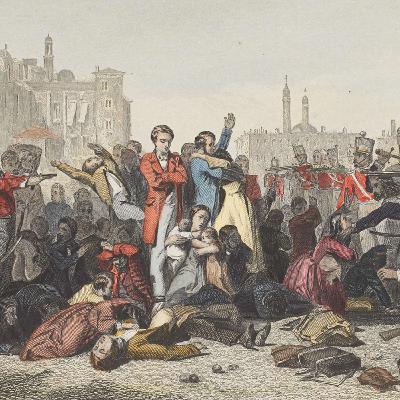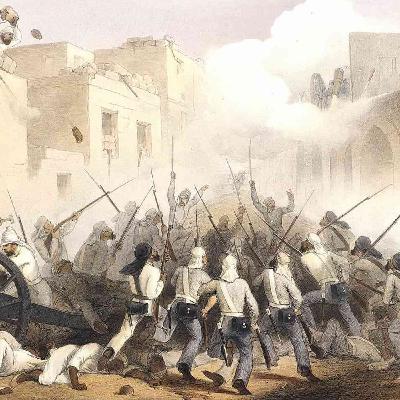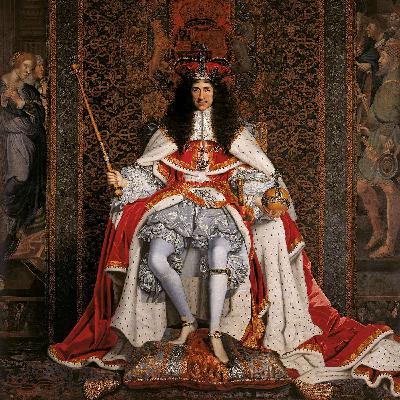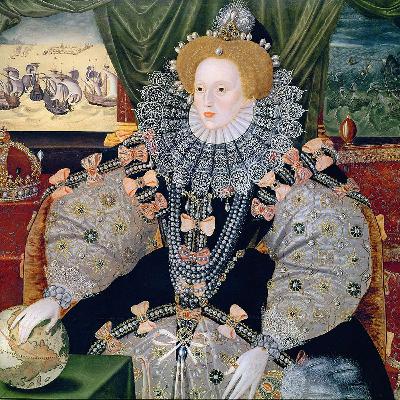Discover The History Chap Podcast
The History Chap Podcast

The History Chap Podcast
Author: Chris Green
Subscribed: 45Played: 2,241Subscribe
Share
© 2025 The History Chap Podcast
Description
Join Chris Green - The History Chap - as he explores the stories behind British history - the great events, the forgotten stories and the downright bizarre!Chris is a historian by training, and has a way of bringing history to life by making it relevant, interesting and entertaining.www.thehistorychap.com
199 Episodes
Reverse
Send me a message Join my free weekly newsletter In November 1883, an Egyptian army numbering 10,000 and led by British officer, William Hicks (Hicks Pasha) was annihilated by the warriors of the Mahdi in Sudan. Just 300 troops out of that 10,000 army managed to reach the safety of Khartoum. This battle (the battle of Shaykan) featured at the beginning of the 1966 film "Khartoum" starring Charlton Heston. The defeat undermined Egyptian authority in Sudan and in desperation they asked the ...
Send me a message During the Indian Revolt of 1857-59, a young 29-year old warrior queen, rose up and led her people against the British Empire. This is the story of the Rani of Jhansi. Part 5 in my series on the Indian Revolt of 1857 (Rebellion / Sepoy Mutiny / Indian Mutiny / First War of Independence). Join my free weekly newsletter Visit Website Support the show
Send me a message For nearly 5 months a British garrison of 1,500 troops and a similar number of civilians were surrounded by Indian rebels at the Residency at Lucknow. This is the incredible story of a failed rescue, a rescue which ends up being besieged too, and finally their rescue by the general who commanded the "Thin Red Line" during the Crimean War. En-route we meet the first civilian to be awarded the Victoria Cross and the first black man to receive the VC too. And we also meet the...
Send me a message The Cawnpore Massacre in 1857 was a defining moment in the 1857 Revolt in India. This is episode 3 in my series on the Indian Sepoy Mutiny / Rebellion. Join my free weekly newsletter After a three week siege, the British garrison at Cawnpore surrendered to the Indians who had risen against British rule. Despite being offered safe passage, the British soldiers and civilians were attacked as they tried to board boats taking them to safety. Of the survivors, about 60 men wer...
Send me a message Join my free weekly newsletter This is part 2 in my series on the Indian Rebellion against British rule in 1857 (sometimes called the Sepoy Mutiny or Indian Mutiny). Having left their barracks in Meerut, the sepoys arrived at the ancient Mughal capital of Delhi. Greeted enthusiastically by many in the local population and in the court of the last Mughal emperor they took control of the city. British forces arrived but were not strong enough to take the offensive so tried ...
Send me a message Part 1 in my series on the Indian Sepoy Rebellion of 1857-58. Join my free weekly newsletter The Indian Mutiny, or Sepoy rebellion or First War of Independence was the most critical challenge to British rule in India in the 19th century. It resulted in the loss of thousands of British and Indian lives, it saw savagery that rivals any modern conflict and saw the snuffing out of the last vestiges of the Mughal Empire, the end of the powerful East India Company and the estab...
Send me a message Join My Support's Club Support the show
Send me a message Join My Supporter's Club Support the show
Send me a message Join my Supporter's Club Support the show
Send me a message Join my Supporter's Club Support the show
Send me a message Join my Supporter's Club Support the show
Send me a message Join my Supporter's Club Support the show
Send me a message For a period of 20 years, Britain was almost continually at war with France. Firstly with the Revolutionary regime and then with Napoleon Bonaparte. Victories at the Battles of Waterloo (on land) and Trafalgar (at sea) became defining moments in Britain's growing self confidence and helped propel her into a position of global dominance. The 19th century would be Britain's Century. Join My Supporter's Club Support the show
Send me a message The period from 1740 - 1790 saw Britain emerge as a world power - with interests spanning the globe, a booming economy and growing control of the world's oceans. Join My Supporter's Club Support the show
Send me a message How did the German House of Hanover ever end up on the British throne? This episode explores how it happened and the ensuing fight with the supporters of a rival dynastic claim - The Jacobites. Join my Supporter's Club For 100 years, four Hanoverian kings named George sat on the throne. They were to oversee the last major land battle ever fought on British soil, the conquest of India and Canada, the loss of the American colonies, victory over Napoleonic France, the birth...
Send me a message In this episode in my History of Britain, we explore the tumultuous years between 1660-1689 when the Stuarts are restored to the throne but then James II is usurped by his daughter and her husband, William of Orange, in the "Glorious Revolution". Join my Supporter's Club Support the show
Send me a message Join my Supporter's Club Support the show
Send me a message Join my Supporter's Club Support the show
Send me a message In this episode, we discover the reasons that drove King Phillip to launch his mighty Spanish Armada against England. The subsequent defeat of the Armada was seen by many as the high-point of the Elizabethan Age. Queen Elizabeth stood at the peak of her power - Gloriana - and her country basked in a new self confidence as explorers took the oceans and playwrights took to the stage... Join my Supporter's Club Support the show
Send me a message This is one of those stories from British history that has fascinated people down the generations. In a world ruled by men, two women ascend the thrones of England and Scotland. Relatives and rivals - Elizabeth I of England and Mary Queen of Scots. Join my Supporter's Club When Elizabeth succeeded her sister to the English throne, she did so as a Protestant and, seen by many Catholics, as illegitimate. They believed that she had no right to the throne and looked elsewhere...






















